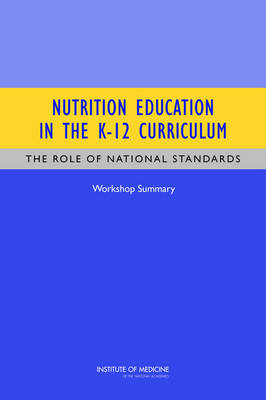
Nutrition Education in the K-12 Curriculum
The Role of National Standards: Workshop Summary
Seiten
2013
National Academies Press (Verlag)
978-0-309-28719-7 (ISBN)
National Academies Press (Verlag)
978-0-309-28719-7 (ISBN)
The IOM report Accelerating Progress in Obesity Prevention: Solving the Weight of the Nation recognized the importance of the school environment in addressing the epidemic. This title offers a summary of the workshop's presentations and discussions prepared from the workshop transcript and slides.
The childhood obesity epidemic and related health consequences are urgent public health problems. Approximately one-third of America's young people are overweight or obese. Health problems once seen overwhelmingly in adults, such as type 2 diabetes, cardiovascular disease, and hypertension, are increasingly appearing in youth. Though the health of Americans has improved in many broad areas for decades, increases in obesity could erode these and future improvements. The IOM report Accelerating Progress in Obesity Prevention: Solving the Weight of the Nation recognized the importance of the school environment in addressing the epidemic and recommended making schools a focal point for obesity prevention. The development and implementation of K-12 nutrition benchmarks, guides, or standards (for a discussion of these terms, see the next section of this chapter) would constitute a critical step in achieving this recommendation. National nutrition education curriculum standards could have a variety of benefits, including the following:
Improving the consistency and effectiveness of nutrition education in schools;
Preparing and training teachers and other education staff to help them provide effective nutrition education;
Assisting colleges and universities in the development of courses in nutrition as part of teacher certification and in updating methods courses on how to integrate nutrition education in subject-matter areas in the classroom and in materials; and
Establishing a framework for future collaborative efforts and partnerships to improve nutrition education.
Nutrition Education in the K-12 Curriculum: The Role of National Standards is a summary of the workshop's presentations and discussions prepared from the workshop transcript and slides. This summary presents recommendations made by individual speakers.
Table of Contents
Front Matter
1 Introduction and Themes of the Workshop
2 The Current Opportunity
3 The Context for Change
4 Lessons Learned from Federal Programs
5 Lessons Learned from State and Local Experiences
6 Perspectives from Educators
7 Teacher Preparation and Training
8 Developing and Implementing K-12 National Nutrition Education Curriculum Standards
References
Appendix A: Statement of Task and Workshop Agenda
Appendix B: Moderator and Speaker Biographical Sketches
Appendix C: Workshop Attendees
Appendix D: Abbreviations and Acronyms
The childhood obesity epidemic and related health consequences are urgent public health problems. Approximately one-third of America's young people are overweight or obese. Health problems once seen overwhelmingly in adults, such as type 2 diabetes, cardiovascular disease, and hypertension, are increasingly appearing in youth. Though the health of Americans has improved in many broad areas for decades, increases in obesity could erode these and future improvements. The IOM report Accelerating Progress in Obesity Prevention: Solving the Weight of the Nation recognized the importance of the school environment in addressing the epidemic and recommended making schools a focal point for obesity prevention. The development and implementation of K-12 nutrition benchmarks, guides, or standards (for a discussion of these terms, see the next section of this chapter) would constitute a critical step in achieving this recommendation. National nutrition education curriculum standards could have a variety of benefits, including the following:
Improving the consistency and effectiveness of nutrition education in schools;
Preparing and training teachers and other education staff to help them provide effective nutrition education;
Assisting colleges and universities in the development of courses in nutrition as part of teacher certification and in updating methods courses on how to integrate nutrition education in subject-matter areas in the classroom and in materials; and
Establishing a framework for future collaborative efforts and partnerships to improve nutrition education.
Nutrition Education in the K-12 Curriculum: The Role of National Standards is a summary of the workshop's presentations and discussions prepared from the workshop transcript and slides. This summary presents recommendations made by individual speakers.
Table of Contents
Front Matter
1 Introduction and Themes of the Workshop
2 The Current Opportunity
3 The Context for Change
4 Lessons Learned from Federal Programs
5 Lessons Learned from State and Local Experiences
6 Perspectives from Educators
7 Teacher Preparation and Training
8 Developing and Implementing K-12 National Nutrition Education Curriculum Standards
References
Appendix A: Statement of Task and Workshop Agenda
Appendix B: Moderator and Speaker Biographical Sketches
Appendix C: Workshop Attendees
Appendix D: Abbreviations and Acronyms
1 Front Matter; 2 1 Introduction and Themes of the Workshop; 3 2 The Current Opportunity; 4 3 The Context for Change; 5 4 Lessons Learned from Federal Programs; 6 5 Lessons Learned from State and Local Experiences; 7 6 Perspectives from Educators; 8 7 Teacher Preparation and Training; 9 8 Developing and Implementing K-12 National Nutrition Education Curriculum Standards; 10 References; 11 Appendix A: Statement of Task and Workshop Agenda; 12 Appendix B: Moderator and Speaker Biographical Sketches; 13 Appendix C: Workshop Attendees; 14 Appendix D: Abbreviations and Acronyms
| Verlagsort | Washington |
|---|---|
| Sprache | englisch |
| Maße | 152 x 229 mm |
| Themenwelt | Schulbuch / Wörterbuch |
| Medizin / Pharmazie ► Gesundheitsfachberufe ► Diätassistenz / Ernährungsberatung | |
| Sozialwissenschaften ► Pädagogik | |
| ISBN-10 | 0-309-28719-7 / 0309287197 |
| ISBN-13 | 978-0-309-28719-7 / 9780309287197 |
| Zustand | Neuware |
| Haben Sie eine Frage zum Produkt? |
Mehr entdecken
aus dem Bereich
aus dem Bereich
Indikation, Diagnostik, Therapie
Buch (2024)
Thieme (Verlag)
CHF 109,95
Physiologische Grundlagen, Prävention, Therapie
Buch | Hardcover (2023)
Wissenschaftliche Verlagsgesellschaft
CHF 165,20


